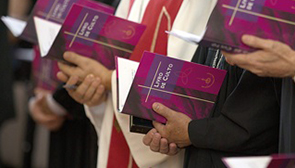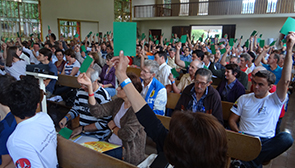The Stellenbosch Consensus
20 theses on Globalization
The following theses were the result of a consultation by leading representatives of German and South African churches Oct. 11-13, 2010, in Stellenbosch/South Africa joining global church bodies such as the World Council of Churches, the World Communion of Reformed Churches and the Lutheran World Federation trying to find a new consensus between North and South on the ethical foundations of globalization and its consequences. The meeting included church leaders, theologians and economists ranging from the president of the World Communion of Reformed Churches, a representative of the World Council of Churches process on Wealth Poverty and Ecology to the Chairman of the Social chamber of the EKD. In light of the so far seemingly different approaches that the churches of the South and those of the North have taken, this “Stellenbosch consensus” is remarkable and can hopefully strengthen already existing efforts in the ecumenical bodies to move beyond unfruitful polarizations. Future consultations will show whether this can be a contribution to finding a new unified voice of the churches in an increasingly globalizing civil society.
Preamble
When churches or individual Christians speak about the economy we are aware of the complexity of economic problems. However, we also know that Christian faith is deeply relevant for the goals and guidelines of economic life. The creation of human being in the image of God, the protection of the stranger and of the widows and orphans in biblical law, the plea for justice by the prophets and the encounter of Christ through the least of his brothers and sisters are only some of the examples for this fundamental characteristic of the biblical tradition. It is on the basis of the biblical story which has become our own story that we offer the following insights on the ethical foundations of globalization and its consequences.
1. Given the global consensus about universal values represented by modern human rights, the fact that around 25 000 people die every day from humanly preventable diseases and reasons is a moral scandal. Responding to this moral scandal must move from the margins of daily political business into the center and become part of real life experiences. This is even more urgent in light of recent global financial and economic crises whose costs are borne by the weakest instead of by those who primarily profit from “polluted and poisoned” mechanisms.
2. Rapid climate change increasingly manifest through droughts, storms and flooding has made it impossible to further deny the social, cultural and ecological destruction that characterizes the dominant ways of “doing economics”. The wide gap in the consumption of natural resources between the wealthy countries of the North and many poor countries of the South reveals the major injustices which need to be addressed in search of a sustainable and just economy for this and subsequent generations.
3. We must overcome simplistic qualifications that evaluate globalization as good or bad and carefully analyze the effect of especially economic globalization on different countries or regions. We need to understand why some countries profit from globalization while others don’t and also evaluate how these different effects coincide with the global dynamics of inequality deeply rooted in the historical injustice of colonialism.
4. If markets are to be recognized as playing a role in the allocation of resources of the economy – and this is not in doubt – national and international regulation must be considered to ensure effective ways of redistribution that enable especially the poorest to decide for themselves about their needs and preferences.
5. Furthermore, markets need a framework of rules which ensure fairer trade, which prevent the exploitation of developing and impoverished nations and which lead to the most possible mutual benefit in trade relations. To strengthen the legal foundation of this effort we call on all Christians globally to advocate – where this has not yet happened – for their governments to sign and ratify the International Covenant on Economic Social and Cultural Rights (ICESCR).
6. While we note that the intention of liberalization of markets over the past three decades was meant to enable impoverished nations to participate equitably in the market and gain access to goods and services at far more affordable prices, the reality has yielded far more serious unintended moral and spiritual consequences. Some of the undesirable effects have been the further weakening of impoverished nations and the prevention of a national development which could lead to a viable and dynamic domestic economy.
7. The basic criterion for judging the ethical quality of economic globalization is not so much liberalization of markets but whether markets possess the potential - in outcome and process – to benefit those who are marginalized and excluded from mainstream economies. In Christian ethics this criterion is based on the biblical “preferential option for the poor” as well as divine justice which seeks to heal the breach between right and wrong. Secular ethics and moral discourse base such judgments on practical reason, human dignity and on philosophical arguments for the maximization of the least advantaged position (Rawlsian difference principle). These philosophical arguments are further supported by new empirical research (f.ex. R. Wilkinson/K. Pickett “The Spirit Level: Why Equality is Better for Everyone”) which argues for the wisdom of creating more equal societies. It confirms all the more the indisputable ethical task of faith communities to turn their members’ attitudes and behavior away from a culture of greed fuelled by consumer driven debt and market based acquisition.
8. This ethically grounded vision leads to a concept of just participation for all on a global scale.
9. Just participation for all must go hand in hand with a use of renewable natural resources (wind, air, wave and sun) by human beings which is ecologically sustainable, freely available, gives every human being more equal access to energy needs and which is – unlike fossil fuels such as coal, oil, gas and nuclear – environmentally beneficial for future generations.
10. An ethical reorientation of globalization must take account of both incentive and inspiration. Alternative models of a global economy of solidarity which presuppose an anthropology of sharing are an important inspiration. And the more successful they are the better. But we also need to take into account the existence of self interest and even egoism. Therefore we need to develop models which maximize ethical concerns even under the circumstances of this imperfect world. We need to develop an ethic of incentives which make it easier for people to follow their ethical impulses on the basis of an enlightened self-interest and how that self interest impacts on the world around us. No person is an island.
11. If capitalism means that profit from capital is the highest or even single goal it is irreconcilable with the ethical perspectives of Christian faith. By contrast, if the possibility of gaining a profit, as an incentive to generate wealth, really increases the participation of everybody, especially the weakest, it is an ethically acceptable option.
12. In light of the fact that the profit motif has a tendency to sustain a self perpetuating dynamic, it risks becoming an end in itself, even an idol. But the appropriate role for profit is instrumental. Hence an economy, national or global, can never be primarily built on the logic of profit. Rather the profit motive must be embedded in the logic of a social contract (understood as secular analogy to a covenant) expressed by a system of Global Governance with an elaborate framework of rules and an institutional setting which put market mechanisms and profit incentives in the service of just participation for allthus generating a people-centred approach to economics rather than a mere profit mentality.
13. The most fundamental challenge for concrete political and economic steps is the creation of a framework for the global market which, by analogy with existing national models of social market economies, strives for an appropriate share of globalization’s benefits for all countries and all segments of societies profit from the economic advantages of globalization.
14. International Trade negotiations have to be redirected unambiguously towards the strengthening of weak economies globally. The strong economies of the North and East have to accept protective measures of weak economies – f. ex. in Africa – where that can help the latter to become more dynamic. Development policy has to be redefined along these lines and must be based on long term common interest instead of short term national interest.
15. Financial markets must be based on a set of rules which reestablishes their role of serving the real economy. A new financial transaction tax contributes to limiting financial speculation, to generate much needed revenue and to seek compensation for the costs of the crisis at the place where it was caused.
16. Economic approaches must be adopted that promote an economic order which does not require a growing use of natural resources. Incentives must be developed that ensure that our prosperity will not have to rely on an ecologically destructive growth.
17. Indicators of economic well being should not focus merely on quantitative GDP growth. Improvements in education, the enhancement of environmental well being and measures that seek to eradicate structural poverty and inequality should all be considered when measuring economic progress.
18. The churches must affirm the radical critique of unquestioned neoliberal dogmas (processus confessionis of Accra) and at the same time move towards an open discourse beyond any dogmas about which policies can best reflect the fundamental ethical orientations of both Christian faith and secular human rights traditions.
19. The churches must make use of their global societal importance and their influence among the global decision makers to help develop a new global consensus for giving priority to global justice over national interests. Their use of financial resources must reflect the urgency of worldwide justice issues. One consequence could be a strategic decision to fund dialogue programs between grass roots groups, business leaders and political decision makers worldwide which help bringing the moral urgency of global injustice into the center of political debates and which support the development of new policies potentially overcoming such injustice. In promoting educational programs at schools and universities which support justice and ecology oriented approaches to the economy, the churches can support a process of reorientation. Through strengthening the work of their development organizations they can help the victims and at the same time support the development of alternative models for the economy.
20. Poverty eradication can be seen as a minimum means of economic justice, Therefore, the Millennium Development Goals (MDG’s) play an especially important role. The churches are called to participate critically in national policies that seek to promote the attainment of MDG’s. Through this engagement they witness what the gospel promises: “fullness of life’ (John 10;10) for all peoples.
Ivan Abrahams, Presiding Bishop, Methodist Church, Chairman of the National Church Leaders Consultation
Prof. Dr. Heinrich Bedford-Strohm, University of Bamberg, Deputy Chairman of the German Protestant Churches (EKD) Social Chamber
Cornelia Coenen-Marx, Head of the EKD Social Affairs Office and Manager of the EKD Social Chamber, Hannover
Malcolm Damon, Economic Justice Network, Cape Town
Dr. Ruth Gütter, Head of the EKD office for Africa und Development Policy, and Manager of the EKD Chamber for Sustainable Development, Hannover
Klaus Heidel, Werkstatt Ökonomie e.V., Heidelberg
Prof. Dr. Gustav Adolf Horn, Director of the Macroeconomic Policy Institute of the Hans-Böckler-Foundation, Düsseldorf, Chairman of the EKD Social Chamber
Dr. Renier Koegelenberg, Executive Director EFSA Institute, Stellenbosch
Prof. Dr. Nico Koopman, Dean of the Faculty of Theology, Stellenbosch University
Canon Desmond Lambrechts, Anglican Diocesis of Cape Town
Prof. Dr. Pieter le Roux, Economics, University of the Western Cape, Bellville
Prof. Dr. Christo Lombard, Religious Studies, University of the Western Cape, Bellville
Dr. Welile Mazamisa, EFSA Institute, Stellenbosch
Dr. Jerry Pillay, Presbyterian Church, President of World Communion of Reformed Churches
Prof. Dr. Gerhard Wegner, Director of the Social Science Institute of the EKD




















